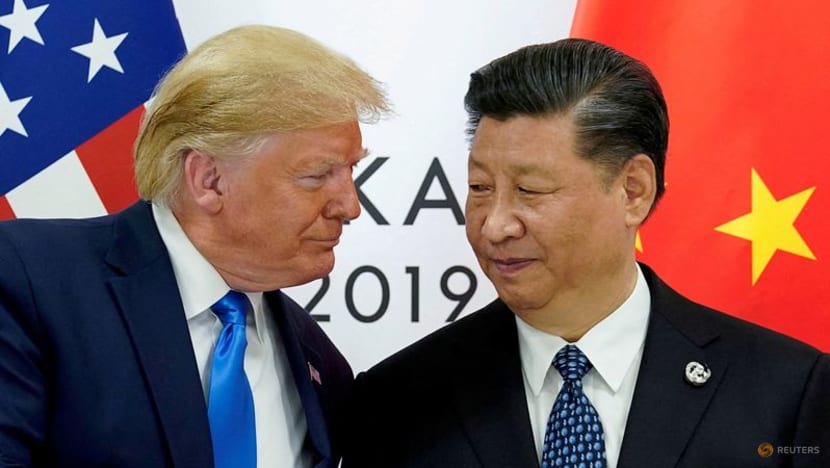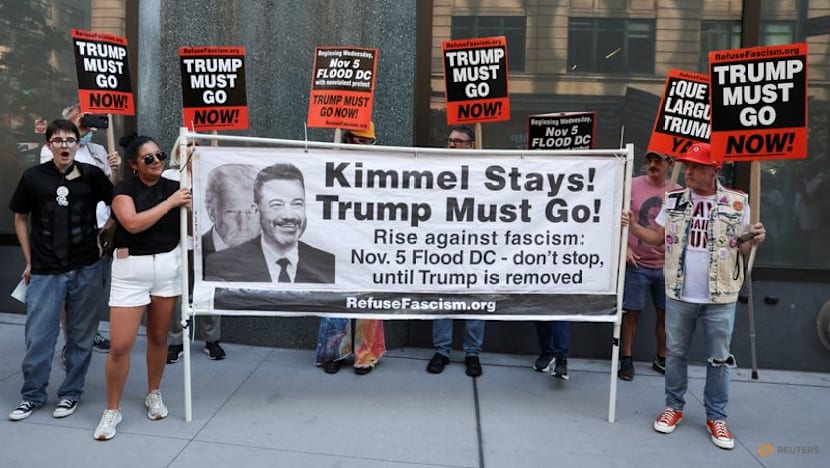Commentary: TikTok deal would be a major win for Trump, but not in the way you might expect
There’s still no confirmed TikTok deal after a much-hyped phone call between Donald Trump and Xi Jinping. But there are concerns beyond national security now, says NTU’s Mark Cenite.

US President Donald Trump meets with Chinese President Xi Jinping at the start of their bilateral meeting at the G20 leaders summit in Osaka, Japan on Jun 29, 2019. (File Photo: Reuters/Kevin Lamarque)

This audio is generated by an AI tool.
SINGAPORE: After his phone call with Chinese President Xi Jinping on Friday (Sep 19), United States President Donald Trump said in a social media post that he “appreciate[d] the TikTok approval”, without further detail. China’s account of the same call made no mention of a finalised deal.
But according to Chinese media reports, Mr Xi said that the authorities welcomed companies’ business negotiations that were consistent with market rules and Chinese laws. It’s a clear departure from Beijing’s earlier stance of being firmly opposed to any forced sale of the popular video-sharing platform or export of its prized algorithm.
If the contours of the agreement trickling out from US officials and media reports earlier this week are confirmed, Mr Trump may have brokered a deal in which Chinese parent company ByteDance would retain less than a 20 per cent stake in TikTok’s American operations. That’s consistent with a 2024 US law requiring the social media platform not to be “controlled by a foreign adversary” to avoid a US ban.
Mr Trump has repeatedly extended the deadline for ByteDance to divest TikTok, now until Dec 16. If the deal is finalised, US companies would control over 80 per cent of TikTok. Tech giant Oracle and investment firms Andreessen Horowitz and Silver Lake Technology Management are expected to be added to the list of American owners.
It would be a major coup for Mr Trump – though not necessarily in the way backers of the 2024 law might have expected.
UNANSWERED QUESTIONS ABOUT NATIONAL SECURITY
Any agreement must meet the law’s requirements, aimed at strengthening national security by addressing risks that ByteDance could manipulate content shown to US users, profile them, or somehow access their personal data.
Reports suggest that US data will continue to be stored separately on Oracle servers in Texas, under what has been known as “Project Texas”. Users in America would need to download a separate app to access the service.
But the crucial ingredient here is still the algorithm. ByteDance – a Chinese company subject to Chinese national security laws – may retain ownership of the algorithm but license it to US TikTok, while US engineers would manage its operation, some reports say.
A Republican lawmaker is among those raising concerns about whether licensing the algorithm complies with the law, which requires no operational relationship with ByteDance.
The 2024 law may have been aimed at national security, but it has opened the door for Mr Trump to “save TikTok” with a solution that aligns with his other efforts to control the media.
Reports indicate that the board overseeing TikTok’s US operations will include a US government appointee. Mr Trump has a history of appointing loyalists, and the holder of TikTok’s so-called “golden share” is unlikely to be any different.
Two of the firms possibly gaining ownership stakes in TikTok are headed by Mr Trump’s allies. Oracle CEO Larry Ellison has long been a vocal supporter and major donor to the president. Marc Andreessen had previously supported Democrats, but he has now become an informal adviser to Mr Trump. He and his firm’s co-founder, Ben Horowitz, publicly backed Mr Trump’s efforts to deregulate technology industries, including cryptocurrency.
Concerns about content manipulation might shift from ByteDance to the US government, prompting legal challenges.
THE LARGER PICTURE OF MEDIA INFLUENCE
Placing a government appointee on TikTok’s board and transferring its ownership to conservative allies isn’t subtle, but the Trump administration’s other efforts to influence the media are even more blatant.
In August, the Republican-controlled Congress halted federal funding for National Public Radio, a widely respected non-profit network that Mr Trump alleges is biased against conservatives.

Last week, US TV network ABC suspended Jimmy Kimmel’s late-night comedy show indefinitely after his comments about the assassination of conservative activist Charlie Kirk and Mr Trump’s response to it.
The comedian has been a consistent critic of Mr Trump, who posted in July that Mr Kimmel would likely be the “next to go”, after news broke that Stephen Colbert’s late-night show would be cancelled.
Then Brendan Carr, the chair of the Federal Communications Commission (FCC), which regulates broadcasters, said: “We can do this the easy way or the hard way. These companies can find ways to change conduct and take action, frankly, on Kimmel, or, you know, there’s going to be additional work for the FCC ahead”.
Given the FCC’s power to revoke licenses, his remarks were interpreted as a threat. Hours later, Disney-owned ABC announced it was suspending the show indefinitely.
ABC is a private company, so its decision did not breach the First Amendment’s free speech guarantees. However, the obvious pressure from the government might, given precedent cases that bar government coercion of the media.
Mr Trump initially described ABC’s decision as based on Mr Kimmel’s lack of talent and his show’s ratings. Later, he told reporters that the FCC should consider suspending the licences of broadcasters that air criticism of him, which he said is “really illegal”- although, in fact, criticism of government is at the core of protected expression.
The 1934 federal law sets out basic licensing requirements for free-to-air broadcasters that also obliges them to serve the “public interest”. The FCC and the courts have interpreted that phrase narrowly, not as permitting censorship of criticism of the government, a clear breach of the First Amendment.
Since his second term began in January, Mr Trump has also been suing media companies. CBS and ABC, both with pending mergers requiring FCC approval, settled lawsuits of questionable merit.
For reporting on his alleged connections to convicted sex offender Jeffrey Epstein, Mr Trump sued the Wall Street Journal in July. Last week, he sued The New York Times for questioning his business acumen during the election campaign, seeking a staggering US$15 billion in damages.
THIS COULD BACKFIRE
In this first year of his second term, Mr Trump and his allies might be overplaying their hand.
They have not hidden their intentions to expand influence over the media, whether through pressuring critics, pursuing lawsuits, or striking a deal that hands control of a social media platform to political allies. In their exuberance, they seem to have forgotten that they have portrayed themselves as defenders of free speech who were cancelled by Democrats.
One of the first prominent Republican figures to remind them is Senator Ted Cruz, who called FCC chair Carr’s threats “unbelievably dangerous”. He warned that actions taken against Mr Kimmel “might feel good now” but could one day backfire and be used to silence conservatives.
Before they alter the rules of American politics, Republicans would be wise to remember that American history shows that power will not remain theirs indefinitely.
Dr Mark Cenite is Associate Dean (Undergraduate Education) at Nanyang Technological University’s College of Humanities, Arts and Social Sciences. He teaches media law and artificial intelligence law at the Wee Kim Wee School of Communication and Information.


















